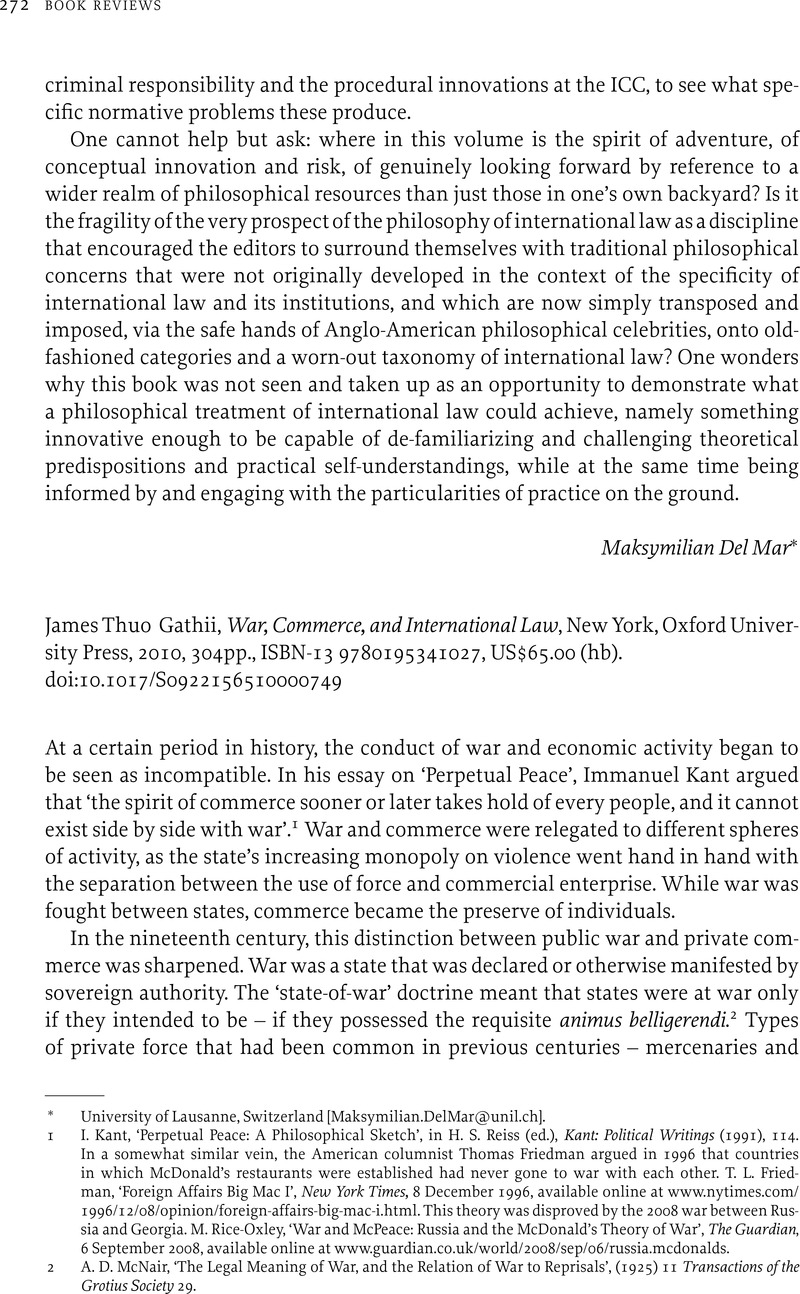No CrossRef data available.
Published online by Cambridge University Press: 11 February 2011

1 I. Kant, ‘Perpetual Peace: A Philosophical Sketch’, in H. S. Reiss (ed.), Kant: Political Writings (1991), 114. In a somewhat similar vein, the American columnist Thomas Friedman argued in 1996 that countries in which McDonald's restaurants were established had never gone to war with each other. T. L. Friedman, ‘Foreign Affairs Big Mac I’, New York Times, 8 December 1996, available online at www.nytimes.com/1996/12/08/opinion/foreign-affairs-big-mac-i.html. This theory was disproved by the 2008 war between Russia and Georgia. M. Rice-Oxley, ‘War and McPeace: Russia and the McDonald's Theory of War’, The Guardian, 6 September 2008, available online at www.guardian.co.uk/world/2008/sep/06/russia.mcdonalds.
2 McNair, A. D., ‘The Legal Meaning of War, and the Relation of War to Reprisals’, (1925) 11 Transactions of the Grotius Society 29Google Scholar.
3 D. Kennedy, Of War and Law (2007), 64. On the history of the control of non-state violence in Europe generally, see J. E. Thomson, Mercenaries, Pirates, and Sovereigns: State-Building and Extraterritorial Violence in Early Modern Europe (1994).
4 W. G. Downey, ‘Captured Enemy Property: Booty of War and Seized Enemy Property’, (1950) 44 AJIL 488.
5 Convention XIII Concerning the Rights and Duties of Neutral Powers in Naval War, The Hague 18 October 1907, in force 26 January 1910, Arts. 6 and 7.
6 Annex to Convention IV Respecting the Laws and Customs of War on Land: Regulations Respecting the Laws and Customs of War on Land, The Hague, 18 October 1907, in force 26 January 1910, Art. 23(g).
7 Ibid., Art. 46. See also Geneva Convention Relative to the Protection of Civilian Persons in Time of War, Geneva, 12 August 1949, in force 21 October 1950, Art. 33.
8 H. A. Smith, ‘Booty of War’, (1946) 23 BYIL 227, at 230.
9 H. A. Smith, ‘The Government of Occupied Territory’, (1944) 21 BYIL 151, at 151.
10 Ibid.
11 UNSC Res. 1483 (22 May 2003), UN Doc. S/RES/1483.
12 The phrase ‘new wars of scarcity’ is borrowed from J. Gray, Heresies: Against Progress and Other Illusions (2004), 115.
13 See J. Sofka, ‘American Neutral Rights Reappraised: Identity or Interest in the Foreign Policy of the Early Republic?’, (2000) 26 RIS 599, at 602. For a different view that emphasizes the differences between American and European approaches to neutrality, see M. Bukovansky, ‘American Identity and Neutral Rights from Independence to the War of 1812’, (1997) 51 IO 209.
14 See generally R. Pares, Colonial Blockade and Neutral Rights, 1739–1763 (1938), 180–204.
15 The most disabling error in the book, however, concerns the numbering of cross-references in the footnotes, which are predominantly incorrect throughout.
16 Convention V Respecting the Rights and Duties of Neutral Powers and Persons in Case of War on Land, The Hague, 18 October 1907, in force 26 January 1910, Art. 7; Convention XIII Concerning the Rights and Duties of Neutral Powers in Naval War, The Hague, 18 October 1907, in force 26 January 1910, Art. 7.